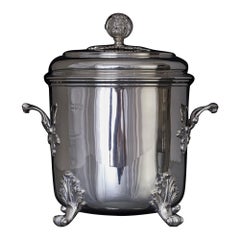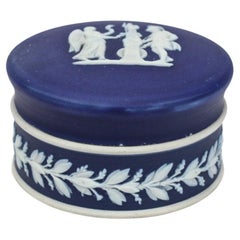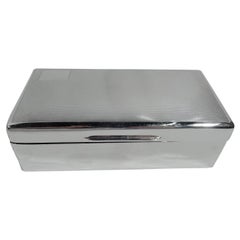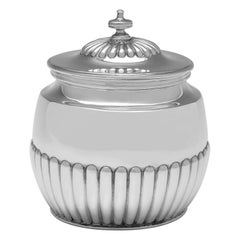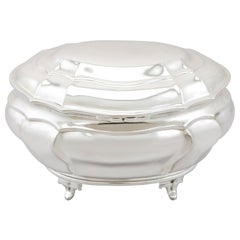Charles Stuart Harris Boxes
Although little information exists about London silversmith Charles Stuart Harris, his exquisite sterling silverware and serveware — the ornate and distinctive bowls encircled with chased scrolling leaf decoration, the platters featuring Vitruvian scrollwork, the centerpieces with their leaf-capped and scrolled arms he designed as well as those produced by the family firm C.S. Harris & Sons Ltd. — is a testament to an age of refinement and elegance.
Harris was from a family of silversmiths active in London in the mid-19th century. In 1817, the firm now known as C.S. Harris & Sons Ltd. was founded by John Mark Harris, a spoon maker. His son, John Robert Harris, took over the family company in 1843, listed as a silver spoon and fork manufacturer.
Neoclassical-style sterling-silver goods in Europe gained popularity in the late 18th century — a taste for sterling-silver tableware, as well as tea sets, had taken shape — while in the United States, beginning in the 19th century, preparing the dinner table with sterling-silver flatware had become somewhat of a standard practice.
Around 1852, the business passed to Charles Harris, who was registered as an electroplater and gilder, a maker of spoons and forks as well as a silversmith. At first, under Harris, the family firm continued as a manufacturer of spoons and forks; however, they later expanded into making cutlery and flatware.
By 1881, the company was formally registered under Harris’s name — Charles Stuart Harris — and it earned a reputation for its utilitarian flatware. In 1897, when the business became known as C.S. Harris & Sons Ltd., they were listed as manufacturers and dealers in gold and silverplate. By this time, the company produced additional furnishings and objects such as serveware, candle holders and tea caddies. They also retailed in wire and lace, silver and gold diamond jewelry and watches.
It is said that by 1900, C.S. Harris & Sons Ltd. sent more silver to London’s Assay Office to be hallmarked than any other silversmith company. Shortly after the turn of the 20th century, Harris retired. In 1933, C.S. Harris & Sons Ltd. merged with I. Freeman and Company.
Today, items produced by Harris remain highly coveted by collectors of Victorian and Edwardian sterling silverware and decorative objects.
Find antique Charles Stuart Harris silver serveware, decorative objects and more collectibles on 1stDibs.
1910s British Art Deco Vintage Charles Stuart Harris Boxes
Sterling Silver
20th Century British Neoclassical Charles Stuart Harris Boxes
Ceramic
1930s English Art Deco Vintage Charles Stuart Harris Boxes
Sterling Silver
Late 19th Century Spanish Art Deco Antique Charles Stuart Harris Boxes
Gold Plate, Silver, Sterling Silver
Early 20th Century French Charles Stuart Harris Boxes
Opaline Glass
Early 20th Century Chinese Charles Stuart Harris Boxes
Brass
Early 20th Century Japanese Art Deco Charles Stuart Harris Boxes
Silver, Silver Plate
1890s Burmese Antique Charles Stuart Harris Boxes
Silver
Mid-20th Century French Mid-Century Modern Charles Stuart Harris Boxes
Wood
1860s French Renaissance Revival Antique Charles Stuart Harris Boxes
Agate, Lapis Lazuli, Silver
17th Century Chinese Ming Antique Charles Stuart Harris Boxes
Wood, Paint
19th Century Japanese Meiji Antique Charles Stuart Harris Boxes
Ceramic
Early 20th Century Italian Charles Stuart Harris Boxes
Porcelain
1890s English Victorian Antique Charles Stuart Harris Boxes
Sterling Silver
1890s British Victorian Antique Charles Stuart Harris Boxes
Silver, Sterling Silver
19th Century British Victorian Antique Charles Stuart Harris Boxes
Silver
